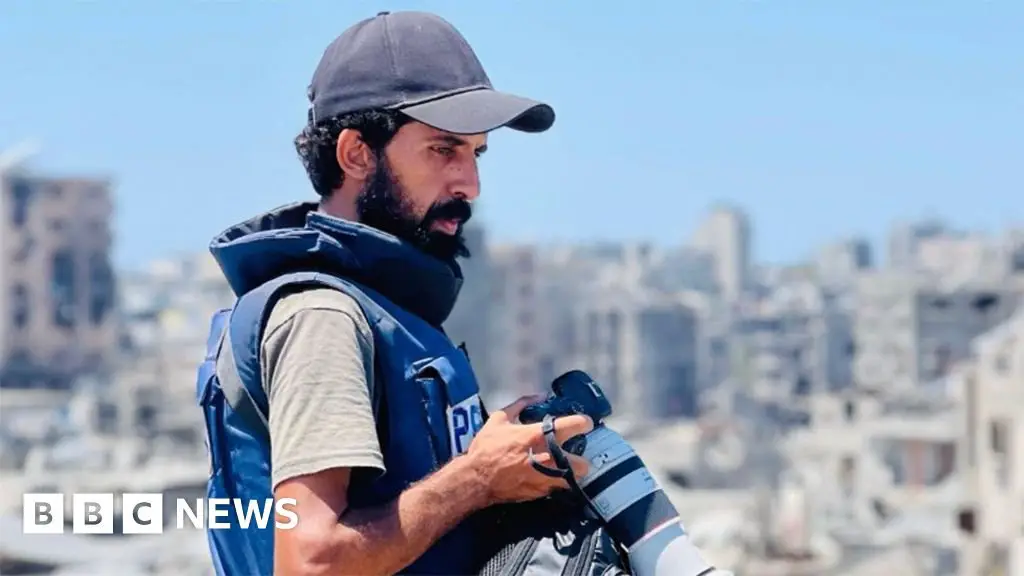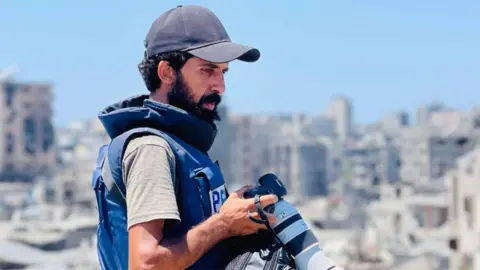 BBC
BBCAccording to a BBC investigation, Facebook significantly limited the ability of Palestinian news outlets to reach an audience during the Israel-Gaza war.
In a comprehensive analysis of Facebook data, we found that newsrooms in the Palestinian territories – Gaza and the West Bank – had suffered a sharp decline in audience engagement since October 2023.
The BBC has also seen leaked documents showing that Instagram – another Meta-owned platform – increased its moderation of Palestinian user comments after October 2023.
Meta – the owner of Facebook – says any suggestion that certain voices are being intentionally suppressed is “clearly false.”
Since the beginning of the Israel-Gaza war, only a few outside reporters have been allowed to enter the Palestinian coastal area of Gaza, and only when accompanied by the Israeli army.
Social media has filled the gap for those who want to hear more voices from Gaza. Facebook pages for news outlets such as Palestine TV, Wafa News Agency and Palestine Al-Watan News Agency – which operate out of the West Bank – became an important source of updates for many around the world.
BBC News Arabic has compiled data on engagement on the Facebook pages of 20 prominent Palestinian news organizations in the year before the October 7 Hamas attacks on Israel and the year after.
Engagement is an important measure of how much influence a social media account has and how many people see its content. This includes factors such as the number of comments, reactions and shares.
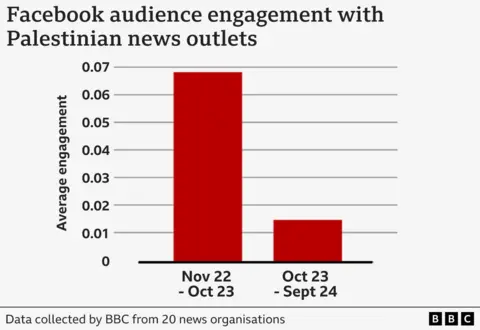
In times of war, an increase in audience engagement is to be expected. However, data showed a 77% decline following the Hamas attacks on October 7, 2023.
Palestine TV has 5.8 million followers on Facebook. Newsroom journalists shared with us statistics showing that the number of people seeing their stories has dropped by 60%.
“Interaction was completely limited and our contributions no longer reached people,” says Tariq Ziad, a journalist at the channel.
Over the past year, Palestinian journalists have expressed fears that their online content will be “shadow banned” by Meta – in other words, limiting the number of people who see it.
To test this, we conducted the same data analysis on the Facebook pages of 20 Israeli news organizations such as Yediot Ahronot, Israel Hayom and Channel 13. These sites also posted a large amount of war-related content, but their audience engagement increased by 10% to almost 37%.
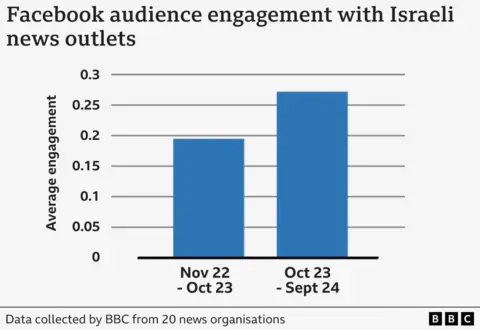
Meta has previously been accused by Palestinians and human rights groups Failure to moderate online activity fairly.
A 2021 independent report commissioned by the company said this was not intentional but was due to the moderators’ lack of Arabic skills. Words and phrases were interpreted as offensive or violent when they were actually harmless.
For example, the Arabic phrase “Alhamdulillah,” which means “Praise be to God,” was sometimes automatically translated as “Praise be to God, Palestinian terrorists are fighting for their freedom.”
To find out whether this explains the decline in engagement with Palestinian media, the BBC conducted the same analysis on Facebook pages for 30 prominent Arabic-language news sources based elsewhere, including Sky News Arabia and Al-Jazeera.
However, these pages saw an average increase in engagement of almost 100%.
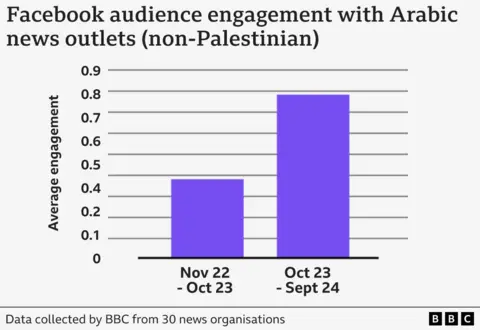
In response to our research, Meta pointed out that it had made no secret of the “temporary product and policy measures” taken in October 2023.
It said it faces the challenge of balancing freedom of expression with the fact that Hamas is both sanctioned by the US and designated as a dangerous organization under Meta’s own policies.
The tech giant also said that pages that post exclusively about the war are more likely to see engagement hit.
“We admit we make mistakes, but any suggestion that we are intentionally suppressing any particular voice is clearly false,” a spokesperson said.
Leaked Instagram documents
The BBC also spoke to five former and current Meta employees about the impact they believe their company’s policies have had on individual Palestinian users.
A person who spoke anonymously shared leaked internal documents about a change to Instagram’s algorithm that tightened moderation for Palestinians commenting on Instagram posts.
“Within a week of the Hamas attack, the code was essentially changed, making it more aggressive toward the Palestinian people,” he said.
Internal messages show that an engineer expressed concerns about the order, fearing that it could “introduce a new bias against Palestinian users into the system.”
Meta confirmed taking the measure but said it was necessary to respond to what it called a “surge in hateful content” from the Palestinian territories.
It said that policy changes made at the start of the Israel-Gaza war had now been reversed, but did not say when this happened.
At least 137 Palestinian journalists have reportedly been killed in Gaza since the conflict began, but some continue despite the dangers.
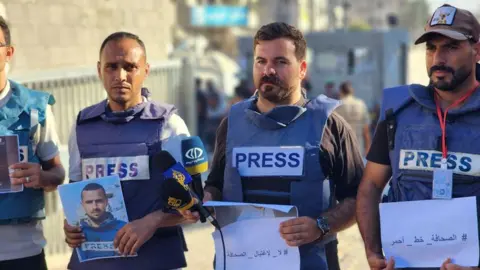 Getty Images
Getty Images“A lot of information can’t be published because it’s too graphic – for example, if the (Israeli) army commits a massacre and we film it, the video won’t spread,” says Omar el Qataa, one of the few photojournalists who support it decided to stay in the northern Gaza Strip.
“But despite the challenges, risks and content bans,” he says, “we must continue to share Palestinian content.”
Additional reporting by Rehab Ismail and Natalie Merzougui


